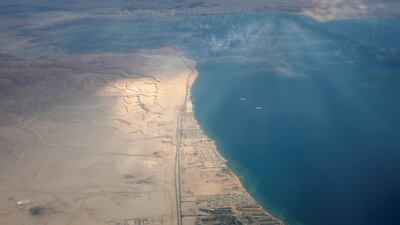Water scarcity is a challenge globally, with disputes around sharing of the resource becoming a key concern and driving conflict in some parts of the world.
The Middle East, rich in resources such as hydrocarbons, is in deficit in terms of water and accounts for a mere 2 per cent of the world’s renewable water supply. The region meets its demand for water through large-scale multibillion-dollar desalination plants and is working on a number of strategies to better manage this scarce resource. We look at what is being done regionally to manage water scarcity.
What is water desalination?
Water desalination is the process by which potable water - that fit for consumption - is produced either by forcing water at very high pressures through a semi-permeable membrane to remove salts and other unwanted minerals, or via electrodialysis. Both techniques usually use sources such as seawater, brackish and surface water - referring to rivers and streams.
What are the differences between membrane and electrodialysis desalination methods?
In membrane-based methods, such as reverse osmosis, water flows through a membrane, which separates out heavier sediments and salts. Desired minerals are then added to the filtered water before packaging or transporting it for consumption. In the electrodialysis method, ions (charged atoms or molecules) driven by electric currents are passed through the water to separate out the unwanted elements.
What regions around the world are highly dependent on water desalination?
The Middle East accounts for nearly half of all desalination capacity globally, simply because of its largely arid and desert landscape, with very minimal rainfall and depleting ground water resources. Water scarcity is particularly acute in the desert landscape of the Arabian Peninsula, where desalination of saltwater is the perhaps the primary way to produce potable drinking water.
What is the global water desalination market worth?
The global water desalination market could reach $26.81 billion by 2025 due to increasing demand from expanding populations, growing industrialisation as well as the accelerating rate of depletion of groundwater and freshwater sources, according to Hexa Research. The Middle East will remain a dominant region for the water desalination market, accounting for 53 per cent of revenue sharing in 2016, and is expected to maintain its dominance over the next six years, because of the high demand and supply of potable water.
____________________
Read more:
ALJ Energy plans carbon-neutral desalination plants fueled by renewable energy
Veolia plans $200m in investments as it looks to expand Middle East footprint
Abu Dhabi unveils a Dh1.6bn underground reserve for desalinated water
____________________
What is the most common way of desalinating seawater in the Middle East?
The Arabian Gulf states largely now use reverse osmosis, the membrane method of desalination. The process consumes less energy compared with the thermal method, which had been deployed earlier, burning crude to generate clean water. In spite of the high adoption of reverse osmosis, the Middle East expends much of its fossil fuel resources towards desalination, a highly energy-intensive activity.
Where are some of the biggest desalination projects in the region?
Saudi Arabia, which has large industrial cities, as well as the UAE, have some of the biggest projects in desalination. Saudi Arabia is looking to develop around $2.5bn worth of desalination projects in the industrial cities Shuqaiq, Yanbu as well as Jubail, and has looked at the privatisation of the kingdom's water sector and distribution business as part of the its Vision 2030 programme. Abu Dhabi announced last year that it was looking to develop a 200 million gallon per day capacity desalination plant, the largest in the world. The scheme at Taweelah is estimated to cost as much as Dh2 billion, due to begin this year with completion aimed at 2021.
Have there been any efforts to reduce the energy-intensity of water desalination projects in the region?
Abu Dhabi, as well as leading water and utilities developers such as Saudi Arabia’s Abdul Latif Jameel Energy, has plans to develop carbon-neutral desalination plants using renewables such as wind and solar to power them.
How are countries with high populations such as Egypt managing supply and demand for water?
Egypt, the Arab world’s most populous state, is reliant on water from the Nile - the world’s longest river - as well as some groundwater resources in the desert but still suffers from water scarcity. The country has put in place a 900 billion Egyptian pound ($50bn) water management strategy for the next two decades. Despite its fresh water resources, Egypt still has a deficit of around 30 billion cubic metres according to government estimates. It requires at least 90 billion cubic metres of water annually to meet growing demand, on the back of an expanding population. Rising sea levels, climate change as well as disputes with neighbouring Ethiopia, which shares the Nile, are major concerns for the country's water supplies.
Are there any ambitious water projects other than desalination to manage water resources more efficiently?
Jordan and Israel, which are both water-scarce countries, have been working out a plan to direct water from the Red Sea to replenish the fast-depleting Dead Sea, which they both share. The project was approved by the Israeli parliament this month, with both countries pledging $40 million each for 25 years. Arid states such Israel have also used the drip adoption technique to manage their water deficits to grow vegetation. Drip irrigation systems (also called trickle) apply water directly to the root zone of the crop via small holes or emitters spaced along polyethylene pipes. Drip irrigation systems are able to precisely control the amount of water delivered to the crop, potentially maintaining a high level of irrigation efficiency. In addition, water losses are also minimised by not irrigating entire fields.


